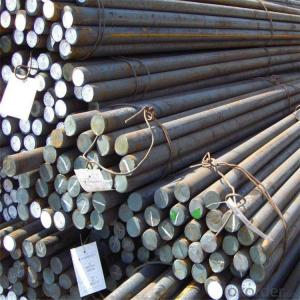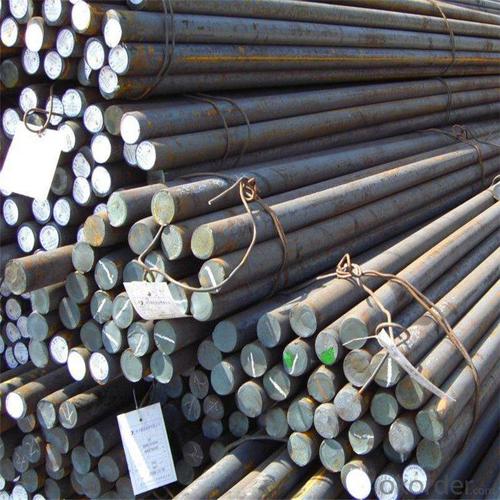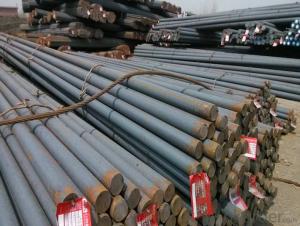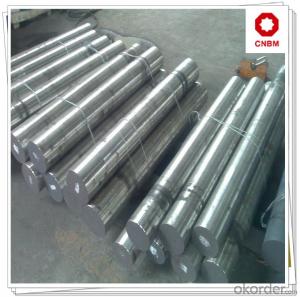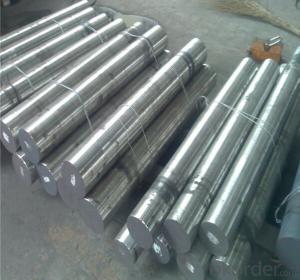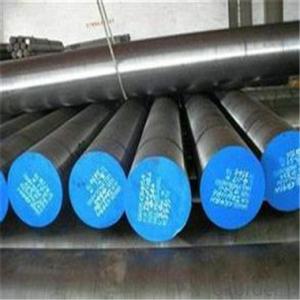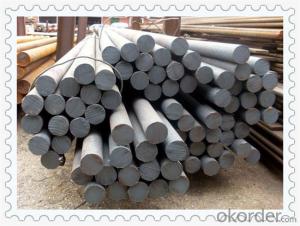Round Bars Carbon Steel SAE1020 AISI1020 S20C C22 S20CB
- Loading Port:
- Tianjin
- Payment Terms:
- TT OR LC
- Min Order Qty:
- 25 m.t.
- Supply Capability:
- 500000 m.t./month
OKorder Service Pledge
OKorder Financial Service
You Might Also Like
Specification
Round Bars Carbon Steel SAE1020 AISI1020 S20C C22 S20CB
Product Description of Round Bars Carbon Steel SAE1020 AISI1020 S20C C22
1. Steel grade: SAE1020, 20#, C22, S20C
2. Length: 6M-12M
3. Diameter: 16mm-300mm
4. Product range: round bar, flat bar, square bar
5. Technique: Hot rolled, forged, cold drawn
Specification of Round Bars Carbon Steel SAE1020 AISI1020 S20C C22 S20
Material | SAE 1020 | Round bar | Dia(mm) | 16-300mm |
Process | EAF + LF + VD + Forged + Heat Treatment (optional) | Length (mm) | Max 12m | |
Heat treatment | Normalized / Annealed / Quenched / tempered | Flat bar | Thickness(mm) | 8-500mm |
Delivery condition | Hot forged +Rough machined (black surface after Q/T)+ Turned (optional) | Width(mm) | 70-200mm | |
Test | Ultrasonic test according to SEP 1921-84 D/d | Length (mm) | Max 12m |
Chemical Composition of Round Bars Carbon Steel SAE1020 AISI1020 S20C C22
C | Si | Mn | Cr | Ni | Cu |
0.17~0.23 | 0.17~0.37 | 0.35~0.65 | ≤0.25 | ≤0.30 | ≤0.25 |
Photo Show of Round Bars Carbon Steel SAE1020 AISI1020 S20C C22
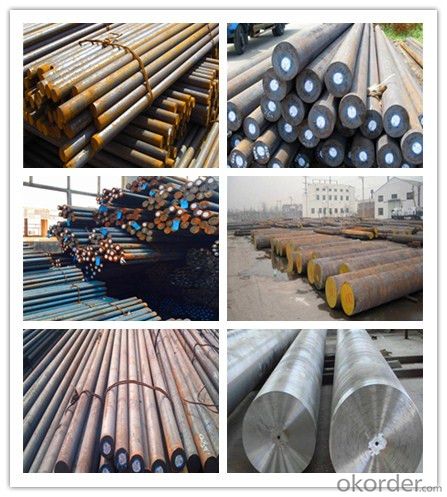
Packing and Delivery:
Packing in bundle package, or as customer's requirements.
Delivery Detail: 45 days after receiving the deposit.
Usage and Applications of Round Bars Carbon Steel SAE1020 AISI1020 S20C C22
1. Steel round bar is used in a large number of architectural and engineering structures. Or it can be used in construction of plants for the production of steel house frames, high-voltage transmission towers, bridges, vehicles, boilers, containers, ships, etc.
2. And we can use this kind of product on the performance of the mechanical parts if the demand is not very high.
3. Some special material steel round bar can be used for main shaft of steamer, hummer shank, with big section and supper force.
Company Information
CNBM International Corporation is the most important trading platform of CNBM group.
Whith its advantages, CNBM International are mainly concentrate on Cement, Glass, Iron and Steel, Ceramics industries and devotes herself for supplying high qulity series of refractories as well as technical consultancies and logistics solutions.


F A Q
1, Your advantages?
professional products inquiry, products knowledge train (for agents), smooth goods delivery, excellent customer solution proposale
2, Test & Certificate?
SGS test is available, customer inspection before shipping is welcome, third party inspection is no problem
3, Factory or Trading Company?
CNBM is a trading company but we have so many protocol factories and CNBM works as a trading department of these factories. Also CNBM is the holding company of many factories.
4, Payment Terms?
30% TT as deposit and 70% before delivery.
Irrevocable L/C at sight.
5, Trading Terms?
EXW, FOB, CIF, FFR, CNF
6, After-sale Service?
CNBM provides the services and support you need for every step of our cooperation. We're the business partner you can trust.
For any problem, please kindly contact us at any your convenient time.
We'll reply you in our first priority within 24 hours.
- Q: What is the difference between a bright and a rough turned steel round bar?
- A bright turned steel round bar and a rough turned steel round bar differ primarily in their surface finish and the level of precision involved in their manufacturing processes. A bright turned steel round bar has a smooth, shiny surface finish. This is achieved by subjecting the bar to additional processes such as polishing or grinding after the initial turning operation. The bright surface finish gives the bar an aesthetically pleasing appearance and can also provide improved corrosion resistance. On the other hand, a rough turned steel round bar has a more textured surface finish. It is typically obtained directly from the turning operation without any additional processes to refine the surface. The rough surface finish may have visible tool marks and a slightly uneven texture. In terms of manufacturing precision, a bright turned steel round bar is typically more accurate and precise in terms of its dimensions and tolerances. The additional processes involved in achieving a bright surface finish also allow for tighter control over the bar's specifications. This makes bright turned bars suitable for applications where precise dimensions and tolerances are critical. In contrast, a rough turned steel round bar may have slightly looser tolerances due to the nature of the turning process and the lack of additional refining operations. However, the rough turned bars can still meet the requirements of many applications that do not require high precision. Overall, the choice between a bright and a rough turned steel round bar will depend on the specific application and the desired surface finish and precision.
- Q: What is the difference between a rough turned and a hot rolled steel round bar?
- A rough turned steel round bar is a type of steel bar that has been partially machined to remove imperfections and excess material, leaving a rough surface finish. This process helps to refine the dimensions and shape of the bar, making it more accurate and consistent. On the other hand, a hot rolled steel round bar is a type of steel bar that has been heated to high temperatures and then passed through a series of rollers to achieve the desired shape and size. This process results in a smooth surface finish and provides a uniform grain structure, which enhances the strength and durability of the steel. In summary, the main difference between a rough turned and a hot rolled steel round bar lies in the surface finish and manufacturing process used to produce them.
- Q: Can steel round bars be used for making agricultural equipment or machinery?
- Yes, steel round bars can be used for making agricultural equipment or machinery. Steel is a commonly used material in the construction of such equipment due to its high strength, durability, and resistance to wear and tear. Steel round bars can be used to manufacture components like axles, shafts, handles, and structural supports, providing the necessary strength and reliability required for agricultural applications.
- Q: What are the factors affecting the price of steel round bars?
- The price of steel round bars can be influenced by various factors. Firstly, the cost of raw materials plays a significant role. This includes the price of iron ore, scrap metal, and other essential components used in steel production. These prices can fluctuate based on supply and demand dynamics in the global market. Another factor is the overall demand for steel round bars. When demand is high, prices tend to increase. This can be influenced by factors such as economic growth, construction and infrastructure projects, manufacturing activities, and international trade. The production and manufacturing costs also impact the price of steel round bars. Expenses like labor, energy, transportation, and technology advancements can all contribute to the final price. Market competition is another factor that affects steel bar prices. When there are more suppliers or alternatives available in the market, prices can be driven down due to increased competition and the need to attract customers. Government regulations and policies can also play a role in pricing. Taxes, tariffs, duties, and trade regulations imposed by governments can impact the cost of steel round bars, especially in international trade scenarios. Lastly, currency exchange rates can influence the price of steel round bars. Fluctuations in currency values can make imported or exported steel products more expensive or cheaper depending on the exchange rate. Considering these factors, it is important for buyers and sellers of steel round bars to closely monitor market conditions and stay informed about any changes that may impact prices.
- Q: What are the environmental benefits of using steel round bars?
- There are several environmental benefits of using steel round bars. Firstly, steel is a highly recyclable material, which means that using steel round bars can help reduce the demand for new raw materials and decrease the amount of waste sent to landfills. Additionally, steel production processes have significantly improved in recent years, resulting in lower emissions of greenhouse gases and air pollutants. Steel is also durable and long-lasting, reducing the need for frequent replacements and saving valuable resources. Overall, the use of steel round bars can contribute to a more sustainable and eco-friendly construction industry.
- Q: What are the advantages of using aluminum-magnesium alloy steel round bars?
- There are several advantages of using aluminum-magnesium alloy steel round bars. Firstly, these bars have a high strength-to-weight ratio, making them lightweight yet sturdy, ideal for applications where weight reduction is crucial. Secondly, the alloy's corrosion resistance properties make it suitable for various environments, including marine and industrial settings. Additionally, aluminum-magnesium alloy steel round bars offer excellent thermal conductivity, allowing for efficient heat dissipation. Lastly, these bars can be easily machined, welded, and formed, providing flexibility during fabrication and reducing manufacturing costs.
- Q: Can steel round bars be used in marine environments?
- Steel round bars can indeed be utilized in marine settings. Nonetheless, it is crucial to select the appropriate steel variant that is specifically engineered for marine purposes. Among the various options, stainless steel stands out as the most frequently utilized due to its ability to resist corrosion. This is primarily due to its high chromium content, which facilitates the formation of a protective oxide layer on the steel's surface, thereby safeguarding it against corrosion caused by saltwater and other harsh elements. Moreover, stainless steel round bars are renowned for their robustness and durability, making them well-suited for an array of marine applications such as ship construction, offshore structures, and marine equipment. To ensure the enduring performance of steel round bars in marine environments, regular maintenance and proper care are imperative.
- Q: Can steel round bars be used for making architectural or decorative elements?
- Yes, steel round bars can definitely be used for making architectural or decorative elements. Steel round bars have various advantages that make them suitable for such applications. Firstly, steel is a durable and strong material, which ensures the longevity and stability of the architectural or decorative element. Additionally, steel round bars can be easily shaped and customized to create intricate designs, making them versatile for various architectural styles and aesthetics. Steel round bars can be used to create features such as railings, balustrades, ornamental gates, sculptures, or even furniture pieces. The smooth and polished surface of the steel round bars also enhances their visual appeal, making them well-suited for decorative purposes. Furthermore, steel is resistant to corrosion, which ensures that the architectural or decorative element will remain intact and aesthetically pleasing even in outdoor or high-moisture environments. In summary, steel round bars are a suitable and popular choice for creating architectural or decorative elements due to their durability, versatility, and visual appeal.
- Q: Can steel round bars be used for tooling applications?
- Tooling applications can indeed utilize steel round bars. Steel, being a highly versatile material, possesses exceptional strength, durability, and resistance to wear and tear. By machining, heat treating, and shaping round bars made of steel, one can create a wide range of tools, including punches, dies, drills, and lathe tools. The round shape of these bars facilitates effortless machining and shaping processes. Moreover, the performance of steel round bars in specific tooling applications can be further enhanced through surface treatments or coatings. All in all, due to their outstanding mechanical properties and adaptability, steel round bars find widespread application in tooling.
- Q: What is the maximum phosphorus content allowed for steel round bars?
- The allowed phosphorus content in steel round bars is determined by the specific steel grade and industry standards, which can vary. Generally, the phosphorus content in steel round bars is typically limited to a maximum range of 0.04% to 0.05%. This limitation is necessary to maintain the desired mechanical properties, including strength, toughness, and ductility, of the steel product. Exceeding this phosphorus content can have negative consequences, such as reduced weldability, increased brittleness, and decreased corrosion resistance. To ensure the quality and performance of steel round bars in different applications, manufacturers and regulatory bodies establish stringent limits on phosphorus content. It is essential to refer to the relevant industry standards or specifications to determine the specific maximum phosphorus content permitted for a particular steel grade or application.
Send your message to us
Round Bars Carbon Steel SAE1020 AISI1020 S20C C22 S20CB
- Loading Port:
- Tianjin
- Payment Terms:
- TT OR LC
- Min Order Qty:
- 25 m.t.
- Supply Capability:
- 500000 m.t./month
OKorder Service Pledge
OKorder Financial Service
Similar products
Hot products
Hot Searches
Related keywords
